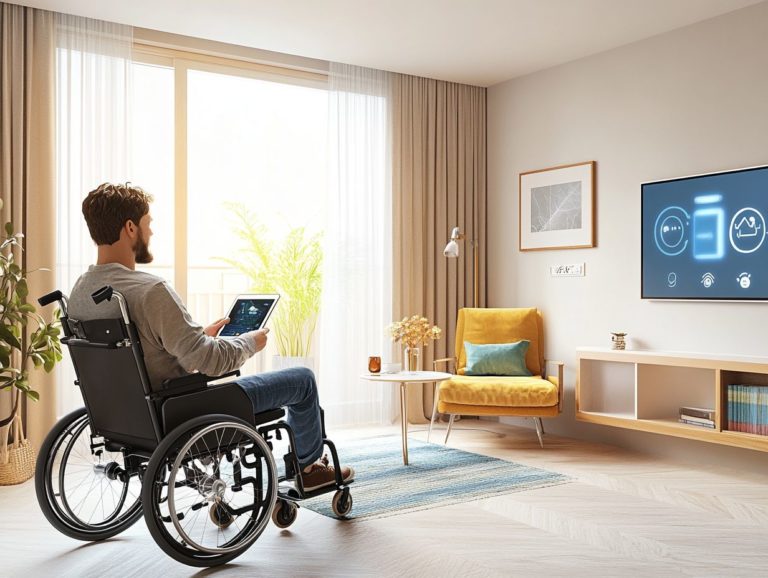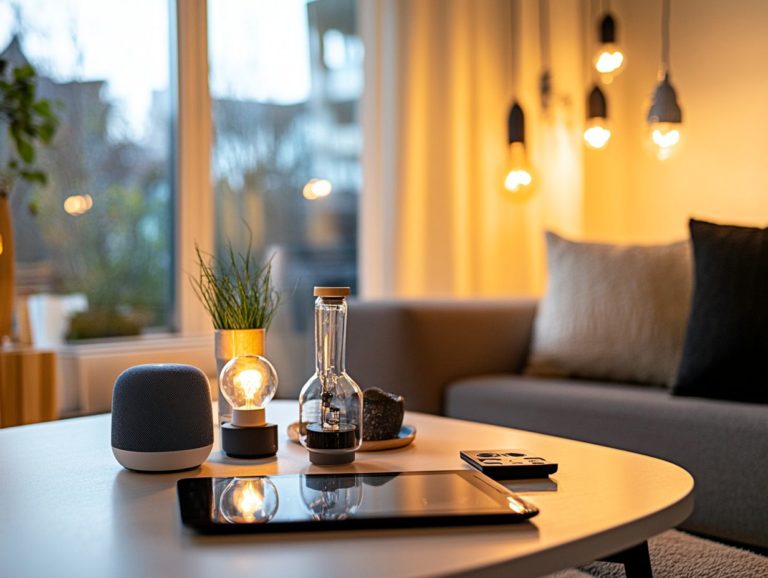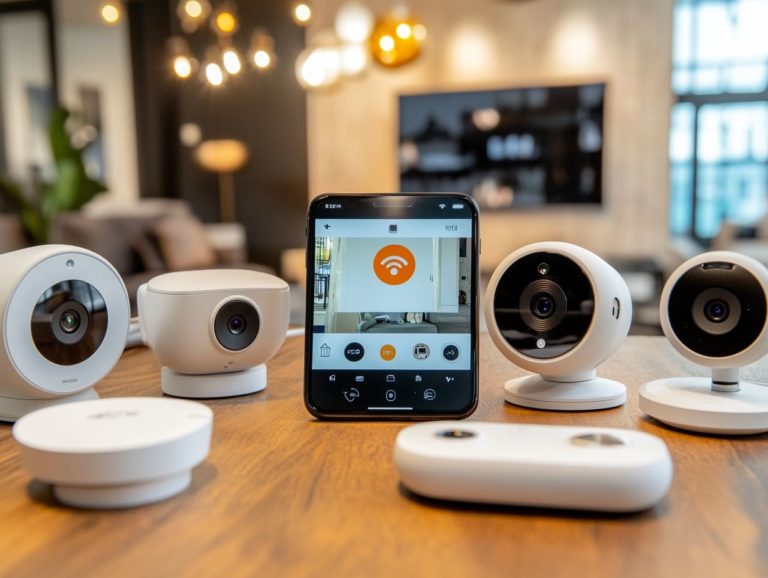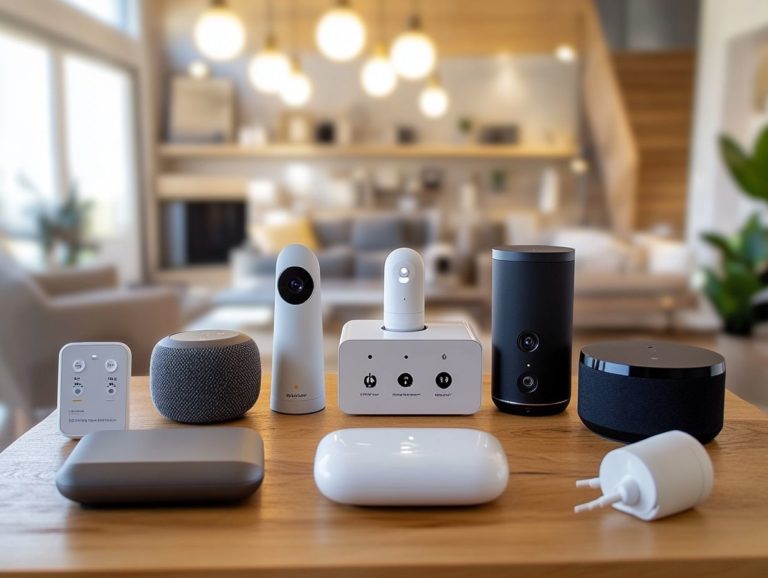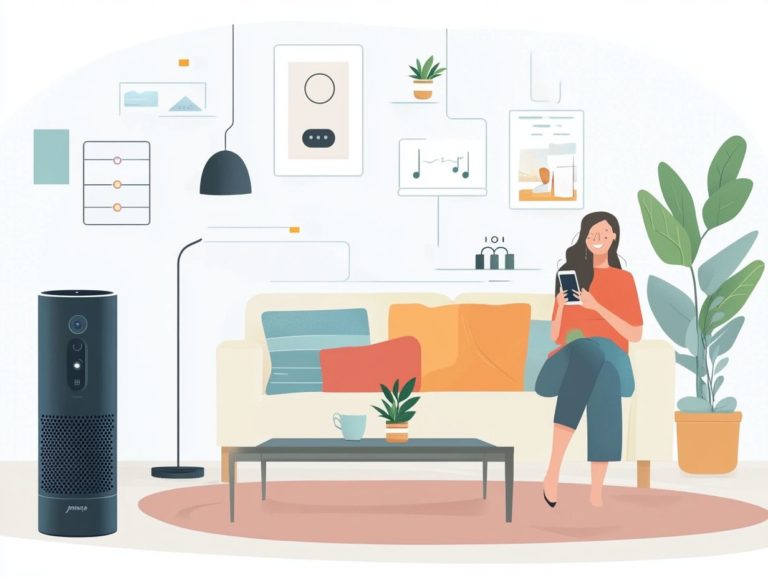The Role of Blockchain in Smart Homes
Smart homes are rapidly gaining traction, delivering unparalleled convenience, efficiency, and enhanced security through a network of interconnected devices.
But imagine if these homes could reach an even greater level of intelligence. Enter blockchain technology a revolutionary system poised to redefine how you manage and secure your living spaces.
This article delves into the essentials of smart homes and blockchain, exploring their integration and the myriad advantages and challenges that accompany it.
Uncover how blockchain is set to shape the future of smart homes and discover the real-world applications already making a significant impact.
Dive in now and discover the exciting potential!
Contents
- Key Takeaways:
- Understanding Blockchain Technology
- Integration of Blockchain in Smart Homes
- Real-World Applications of Blockchain in Smart Homes
- The Future of Blockchain in Smart Homes
- Frequently Asked Questions
- What is the role of blockchain in smart homes?
- How does blockchain technology benefit smart homes?
- Can blockchain help in managing energy consumption in smart homes?
- Is blockchain suitable for all types of smart home devices?
- Are there any privacy concerns with blockchain in smart homes?
- How can blockchain technology improve the overall user experience in smart homes?
Key Takeaways:
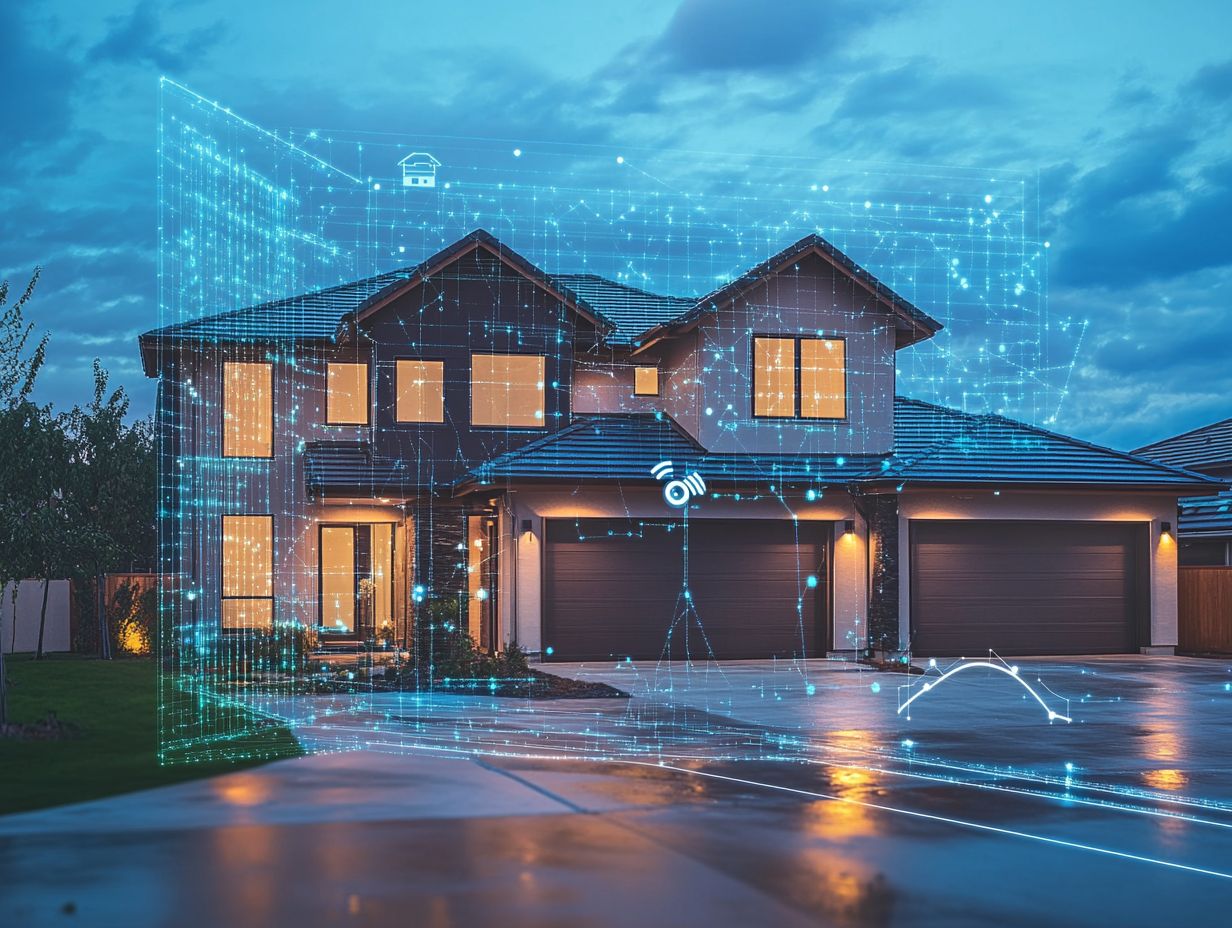
Blockchain technology offers a secure and transparent way to manage data in smart homes, ensuring privacy and preventing tampering. Integrating blockchain in smart homes can lead to efficient energy management, secure automation, and convenient payment systems. Blockchain in smart homes is set to advance even further, positively impacting the way we live, work, and interact with our homes.
What are Smart Homes?
Smart homes embody a revolutionary approach to contemporary living. Interconnected devices and systems elevate convenience, efficiency, and security for you.
These homes use various IoT devices, ranging from smart thermostats to advanced security cameras, allowing seamless communication between technologies. By tapping into wireless networks, you can control your home environment from virtually anywhere, optimizing energy use and enhancing your comfort.
However, the convenience of smart homes doesn’t come without vulnerabilities. For instance, hackers may exploit weak security protocols or outdated software. To safeguard against such risks, prioritize strong security measures, including regular updates and the installation of firewalls, ensuring your digital sanctuary remains protected while you fully embrace the benefits of this cutting-edge lifestyle.
Benefits of Smart Homes
The benefits of smart homes are impressive, offering enhanced convenience, energy efficiency, and improved security through automated services and real-time data monitoring.
By integrating IoT devices, you can effortlessly control lighting, heating, and even security systems right from your smartphone. This creates an environment that not only responds to your needs but also generates significant energy savings.
With this level of automation, energy is used more efficiently, helping to reduce waste and lower your utility bills. Plus, the enhanced safety features provided by smart technology like automated alerts and surveillance systems offer you invaluable peace of mind.
These systems work together seamlessly, crafting a living space that s both comfortable and secure, allowing you to monitor your home at any time, no matter where you are.
Understanding Blockchain Technology
Grasping blockchain technology is essential for appreciating its transformative potential across various sectors, including finance and smart homes. This technology offers a decentralized architecture that significantly enhances security and transparency through a peer-to-peer network.
Unlike traditional centralized structures, blockchain employs a network configuration that ensures both data integrity and confidentiality, using hash functions to secure transactions.
Platforms like Ethereum show the versatility and robustness of this technology, opening the door to a myriad of innovative applications.
What is Blockchain?
Blockchain stands as a revolutionary technology, offering you a decentralized architecture for recording and validating transactions while ensuring data integrity through advanced cryptographic hash functions.
Each unit of information, referred to as a block, houses a series of validated and timestamped transactions, intricately linking it to the preceding block and thus establishing a secure chain. This structure not only bolsters security but also nurtures transparency and trust among all participants in the network.
At the heart of blockchain’s functionality are consensus mechanisms, which guarantee that every copy of the distributed ledger remains synchronized and accurate, thwarting unauthorized alterations. These components work in harmony to create a robust framework capable of facilitating a wide array of applications beyond mere cryptocurrencies, including supply chain management and digital identity verification.
In conclusion, the integration of blockchain technology into smart homes is set to revolutionize our daily lives, enhancing security, efficiency, and convenience.
How Blockchain Works
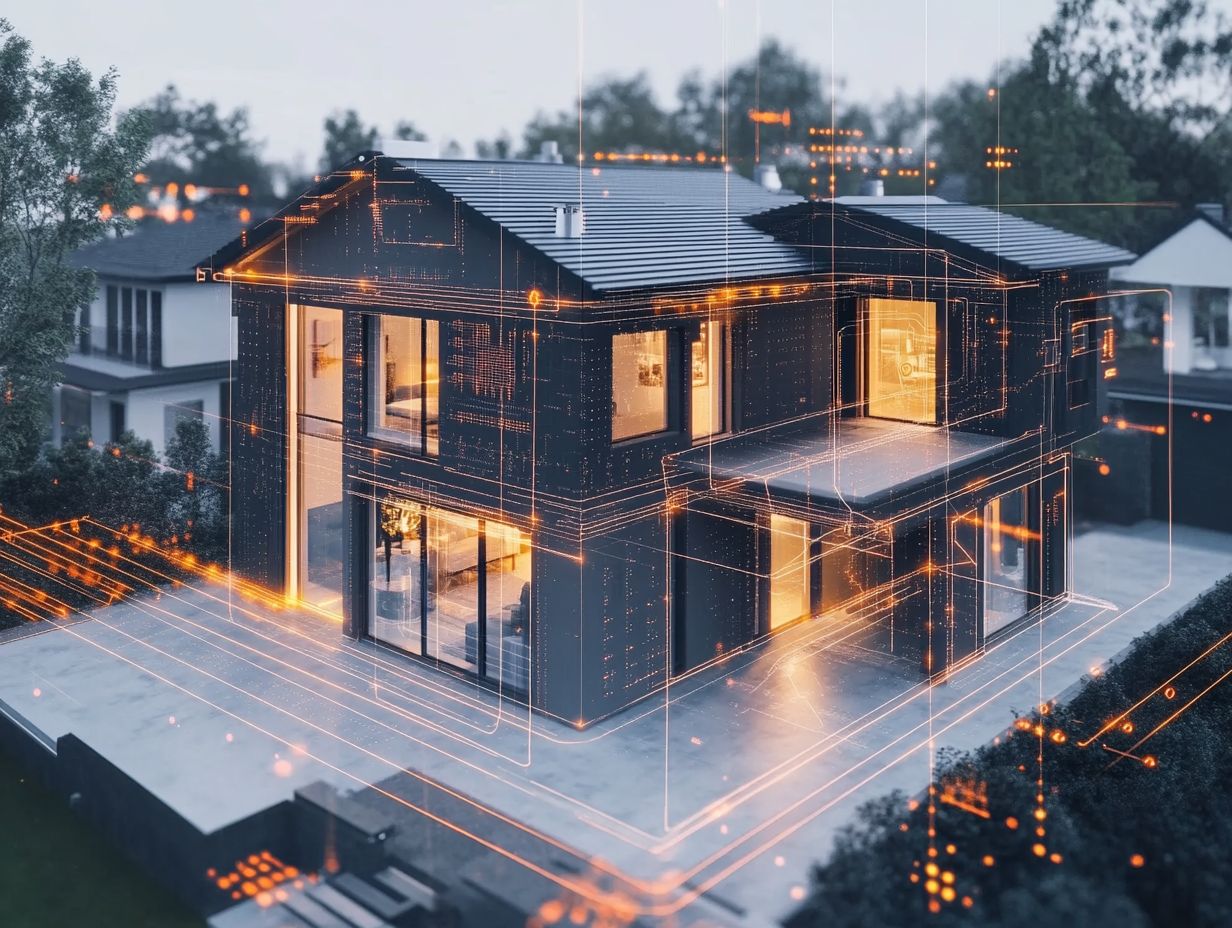
Blockchain operates through a peer-to-peer network, a network where participants directly connect with each other without a middleman. Every transaction is meticulously recorded in a distributed ledger, ensuring robust security and transparency.
In this advanced system, each participant possesses a complete copy of the ledger. This means no single entity can dominate the entire network.
Transactions undergo verification through a consensus mechanism. Multiple nodes collaborate to confirm the validity of a transaction before it gets added to the blockchain. This rigorous process not only enhances accuracy but also fortifies security, making it nearly impossible for any individual to alter the record without the agreement of the majority.
Once verified, transactions are grouped into blocks and permanently linked to the preceding blocks, creating an immutable chain that stands firm against tampering and fraud. This decentralized approach cultivates trust among users and promotes a fair, secure method of data exchange.
Integration of Blockchain in Smart Homes
Blockchain technology is revolutionizing smart homes, making them smarter and more secure. The integration of blockchain technology in smart homes transforms how IoT devices communicate and function.
This advancement enhances security against vulnerabilities and facilitates automated services that significantly elevate your user experience.
Advantages of Using Blockchain in Smart Homes
The advantages of using blockchain technology in smart homes are compelling. It offers heightened security and data integrity an enticing prospect for anyone seeking dependable automation solutions.
By decentralizing control and enhancing transparency, this advanced technology greatly diminishes the risk of data breaches. It ensures that every interaction within your home remains secure and private.
The automation of home systems becomes markedly more efficient, as real-time tracking gives you the power to monitor and manage your devices effortlessly. With immutable records stored on the blockchain, you can trust that your data is both accurate and safeguarded, boosting your confidence in integrated smart home management.
This holistic approach elevates your user experience and cultivates a more dependable ecosystem tailored to your unique needs.
Challenges and Limitations
Despite its many advantages, implementing blockchain in smart homes presents several challenges for you to consider. Key issues include security vulnerabilities, scalability, and integration with existing centralized systems.
These obstacles extend beyond just technical limitations; user acceptance is crucial for the technology’s success. Many individuals remain skeptical about decentralized systems due to a lack of understanding and concerns over potential security vulnerabilities that may surface during the transition.
Regulatory issues also play a significant role, as the current legislative framework often falls short of addressing the complexities involved in integrating blockchain into home automation. These factors create substantial barriers that must be navigated to fully unlock the potential of blockchain in enhancing smart home ecosystems.
Real-World Applications of Blockchain in Smart Homes
Discover how blockchain is rapidly transforming smart homes into secure hubs of innovation! Real-world applications of blockchain in smart homes are on the rise, revealing the potential of this technology to elevate automation and security in countless scenarios, ranging from energy management to payment systems.
Smart Energy Management
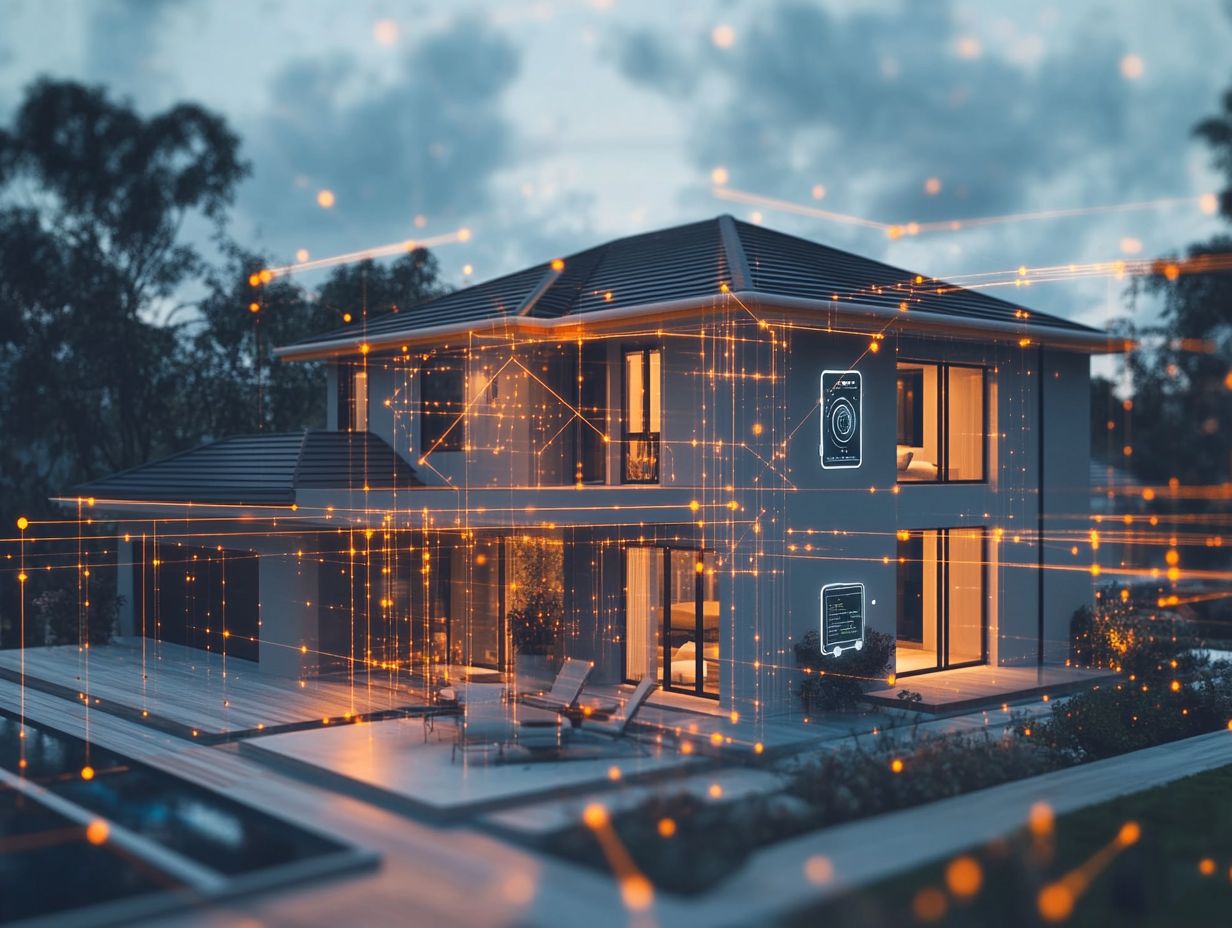
Smart energy management, powered by blockchain technology, gives you the power to optimize energy usage in your smart home with remarkable efficiency.
By harnessing IoT devices, you can monitor your consumption in real-time. This innovative approach not only elevates the overall efficiency of your energy consumption but also grants you an unprecedented level of control over your energy resources.
With decentralized ledgers integrated into the system, every device from smart thermostats to energy-efficient appliances communicates seamlessly, providing you with instant feedback on your usage patterns.
You can track your energy consumption in detail, pinpoint peak usage times, and adjust your habits accordingly. You can also trade energy directly with others, sharing surplus energy generated by your solar panels and transforming your home into an active participant in a larger energy ecosystem.
As you explore blockchain’s potential in smart homes, consider how it can enhance your lifestyle and security.
Secure Home Automation
Securing your home automation with blockchain technology offers you unmatched protection against unauthorized access and data breaches. This ensures the integrity of your smart home systems.
By using decentralized records, this technology confirms the authenticity of your devices and safeguards the data shared within these networks. Every interaction between your smart devices like a thermostat adjusting the temperature or a security camera streaming footage is encrypted and securely logged.
This shows that any attempts to tamper with or falsify this data become readily apparent, fostering a sense of trust in the system. Home automation systems are expanding, and integrating blockchain can enhance your verification processes. This enables you to customize permissions for various devices while maintaining the highest level of security.
This seamless application of blockchain fundamentally transforms the smart home landscape, providing reassurance that your home is not only technologically advanced but also well-protected against evolving threats.
Smart Payment Systems
Smart payment systems powered by blockchain technology allow you to conduct secure and efficient transactions within your smart home. Don t miss out on the future of hassle-free payments!
These advanced platforms not only simplify the payment process for your everyday purchases but also elevate your experience by automating transactions through your smart devices.
By using decentralized records, these systems transparently record every transaction, making unauthorized changes nearly impossible.
With features like multi-factor authentication and using fingerprints or facial recognition, you can rest assured that your financial information stays protected from potential breaches.
The combination of transaction efficiency and robust security measures shows that embracing smart payment systems is more than just a trend it’s a savvy choice for the modern household.
The Future of Blockchain in Smart Homes
The future of blockchain in smart homes looks incredibly exciting! Continuous advancements are set to elevate both user experience and security.
As these innovations unfold, you can expect an expanded array of applications that will significantly enrich your smart home experience.
Potential Developments and Impacts
Potential developments in blockchain technology could profoundly reshape the smart home landscape, enhancing your user experience and strengthening security measures.
As decentralized networks become more prevalent, you may find yourself gaining greater control over your connected devices. Imagine blockchain providing a transparent and immutable record of your interactions with smart appliances, ensuring data integrity and building trust.
The ability to execute smart contracts agreements executed automatically by computer code could automate your routine tasks, making energy consumption and security protocols a breeze to manage.
As the industry evolves, these advancements are set to improve efficiency and establish a new standard for privacy protection, creating a more intelligent and responsive living environment tailored just for you.
Frequently Asked Questions
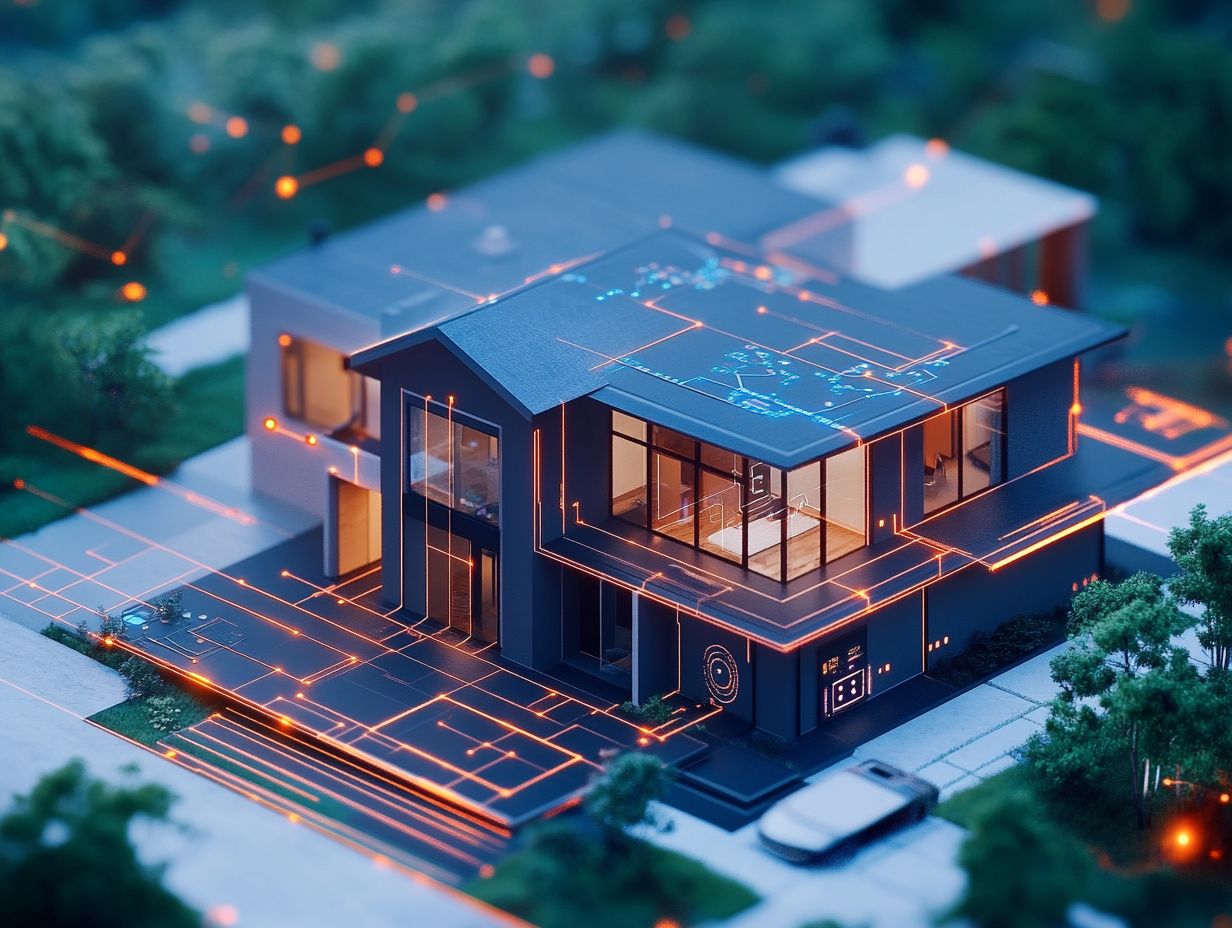
What is the role of blockchain in smart homes?
The role of blockchain in smart homes is to provide a secure and decentralized platform for managing and storing data collected by various smart devices. It also enables efficient and transparent communication between different devices, creating a seamless and automated experience for homeowners.
How does blockchain technology benefit smart homes?
Blockchain technology offers numerous benefits to smart homes, including enhanced security, data privacy, and interoperability. It reduces the need for intermediaries, lowers transaction costs, and increases efficiency in managing smart home systems.
Can blockchain help in managing energy consumption in smart homes?
Yes, blockchain can play a significant role in managing energy consumption in smart homes. By using smart contracts and real-time data from connected devices, blockchain can optimize energy usage and facilitate peer-to-peer energy trading, making homes more energy-efficient and cost-effective.
Is blockchain suitable for all types of smart home devices?
Yes! Blockchain technology works with many smart home devices like thermostats, security cameras, and smart locks. You can use it with both new and old devices, making it a flexible choice for smart homes.
Are there any privacy concerns with blockchain in smart homes?
Blockchain offers better data privacy than traditional systems. However, since data is stored on a spread-out storage system, it’s crucial to have strong encryption and control measures to safeguard sensitive information.
How can blockchain technology improve the overall user experience in smart homes?
Blockchain enhances the user experience by allowing smooth and automated communication between devices. This reduces manual inputs and provides a secure platform for managing your smart home systems. It also simplifies setup and maintenance.


